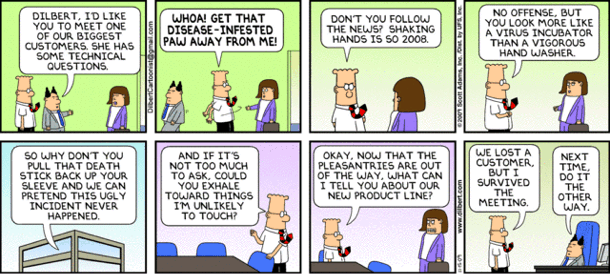 Don't touch me, I'm sterile!
Don't touch me, I'm sterile!
Ed Norton (played by the talented Art Carney) from the 1950's TV show the Honeymooners never fathomed that his numskull one-liner would, a century later, become a daily caution for the entire world population! Imagine: Returning home after being out and about and not being able to enter your main living quarters until you washed and changed from your "outside" clothes.
Imagine:
Imagine:
Imagine:
Imagine:
Imagine:
Imagine:
Imagine: ***** At about the same time that Phrenicea came into being, drastic behavioral modifications were adopted to avoid contracting virulent infectious diseases.RealityCheck! After decades of the world's population commingling as the result of technology making the world smaller, super-precautionary lifestyles were the norm as germs became more resistant to the efforts to eliminate them. Those brave enough to be peripatetic had to be ever conscious of potential sources of contamination such as doorknobs, handles, handrails, seats and other objects of common contact. (Water fountains, velour seats and buffet servers become hot collectibles!) Even more challenging was trying to avoid inhaling airborne skin detritus and mucous droplets. This fear of contamination was a significant contributing factor leading to an almost universal acceptance of cubicle dwelling by midcentury. Venturing out ITF or "in the flesh" was a rare event accompanied by bizarre behavioral adaptations such as:
Making matters worse, mass disinfections became a common occurrence, not unlike the highly publicized procedure performed in 2002 on the cruise ship Amsterdam as it sat idle for a thorough disinfecting to combat the Norwalk virus. Every pillow and mattress was replaced, gift shop souvenirs were destroyed and literally every surface of the ship's interior and deck was awash with a chlorine solution. So enjoy the buffets, soft velour seating and other aspects of today's life that we take for granted — and try not to be conscious of what may be lurking on whatever you come in contact with in the public domain! Chronicling the Future®
This page belongs to
Entire site ©2000-2014 John Herman. All rights reserved. |

